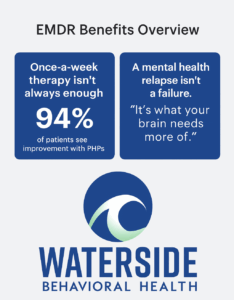There’s a particular kind of silence that comes after a relapse in your mental health. It’s not always dramatic. Sometimes, it’s invisible even to the people closest to you.
It’s the moment you realize it’s been four days since you’ve returned a call. The moment your bedroom feels like a cave again. The realization that you’re spiraling—quietly, completely—and you can’t pinpoint where it started.
If you’re reading this, you might already be there. And if you’ve been in treatment before, it probably feels like this shouldn’t be happening again.
But I want to say something that matters more than the shame voice in your head right now:
You didn’t fail. Your brain is asking for more help—and that’s okay.
You Knew the Tools. But They Slipped Through Your Hands.
When you’ve been through therapy or treatment before, the hardest part of relapsing—mentally, emotionally—isn’t just the pain. It’s the self-blame.
You knew what to do. You practiced the skills. Maybe you even helped someone else with theirs.
So why does your chest feel like a panic cave again? Why are you back to bracing against every morning?
Here’s the quiet truth no one tells us after recovery: mental health isn’t a staircase—it’s a spiral. And just because you circled back doesn’t mean you’re in the same place.
When “More Therapy” Doesn’t Feel Like Enough
You might’ve tried to patch things together—squeezed a few therapy sessions in, downloaded another meditation app, maybe even returned to journaling.
But when your mental health relapse is deep enough, once-a-week therapy often isn’t enough structure to keep you grounded. And inpatient might feel too extreme or disruptive.
That’s where a Partial Hospitalization Program (PHP) can help.
It’s a structured mental health program that gives you real support—without requiring you to put your life on hold. It’s where you go when you need more than a check-in… but not a hospital bed.
What a Partial Hospitalization Program Really Looks Like
At Waterside Behavioral Health, our PHP offers high-level care with real flexibility. You attend several hours a day, multiple days a week. You work with a dedicated team—therapists, group leaders, psychiatric providers—all focused on helping you stabilize and reclaim your sense of self.
You sleep at home. You get to hold onto parts of your routine. But inside that structure, you finally get breathing room—enough time and space to unpack what’s been building underneath.
A PHP isn’t just more therapy. It’s relief. Regulation. Realignment.
This Isn’t a Setback. It’s an Upgrade in Support.
Let’s bust a myth: Going back into treatment doesn’t mean you’re starting over.
You’re not that person who first walked into group, hollowed out and afraid.
You’re wiser now. More aware. More in tune with what you need—even if that need feels embarrassing to say out loud.
You’re not broken. You’re self-aware enough to know something’s not right—and brave enough to consider doing something about it.
That’s not weakness. That’s growth.
What If the Shame Is the Loudest Voice?
I won’t lie—this is the part that hurts the most for many alumni. Not the symptoms. Not even the relapse.
It’s the internal voice that says: “You had your chance.”
“You should be stronger than this by now.”
“They’re going to judge you.”
But here’s what the real ones know: People who come back for help aren’t weak. They’re the strongest ones in the room.
They’re the ones who know how hard it is to ask again—and do it anyway.
You’re Still Worth the Investment
If your mental health has been spiraling, it’s tempting to downplay it.
To tell yourself it’s just a rough patch. To wait until it’s so bad you can’t hide it anymore. But here’s what I’ve learned:
Healing doesn’t respond to guilt. It responds to care.
Your mental health deserves the same urgency as a physical injury. If you had a broken bone, you wouldn’t walk it off until it shattered. You’d get help. So let’s stop asking your heart and nervous system to limp through this alone.
If you’re looking for a Partial Hospitalization Program in Plymouth or Bristol County, MA, Waterside is here to offer that in-between level of support—with no pressure and no judgment.
A Day in the Life of PHP at Waterside
What would it actually feel like to step into a PHP again?
Here’s a snapshot:
- Morning group starts with grounding and goal-setting—something doable, not Pinterest-worthy.
- You rotate through CBT, DBT, process groups, maybe a trauma-informed art session.
- There’s a breakroom with coffee, people who get it, and a counselor who actually sees you.
- You go home with tools, not just exhaustion.
It’s not a magic fix. But it’s the kind of structure that lets your nervous system exhale.
Frequently Asked Questions About Partial Hospitalization Programs
Do I have to start over if I return to PHP?
Not at all. Think of it as picking up where you left off—with new insight. You’re not back at square one. You’re building from experience.
Is this for addiction treatment or mental health?
Waterside’s PHP is designed for mental health—including depression, anxiety, trauma, and mood disorders. It’s a safe space for when your mental health needs more than a weekly session.
How long does PHP last?
Programs vary based on your needs, but many last 2 to 4 weeks. Your team will work with you to create a custom plan and help you transition to the right level of care after.
Can I keep working or parenting while in PHP?
That depends. PHP is a daytime commitment—often 4–6 hours a day. Some people arrange flexible work or childcare during that time. We can help you navigate those logistics.
What’s the difference between PHP and IOP?
PHP offers more intensive daily support. If you need stabilization or you’ve had a recent relapse, PHP is usually the best first step. IOP (Intensive Outpatient) is often used after PHP as a step-down.
You Don’t Have to Pretend You’re Fine Anymore
If your mind is loud, your body is exhausted, and the tools you used to lean on just aren’t working anymore—you’re not crazy. You’re not weak. You’re just overdue for a deeper kind of support.
Call 774-619-7750 or visit our PHP services page to find out how Waterside Behavioral Health helps alumni rediscover stability and self-trust through our Partial Hospitalization Program in Plymouth County, MA.





